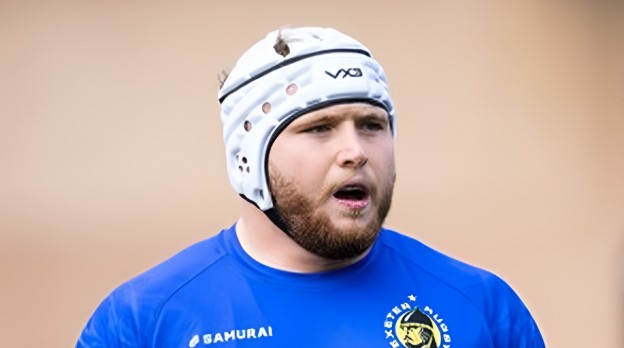Patrick Schickerling: Rising Star from Namibia to the Pinnacle of Tight-Head Prop

Patrick Schickerling has quickly emerged as one of the most promising tight-head props in international rugby. Born in Walvis Bay, Namibia, his journey reflects remarkable perseverance, talent, and a constant drive to improve. This article delves into his early life, professional career, international eligibility, playing style, and future prospects—offering a full view of why Schickerling is a name to watch in world rugby.
Early Life and Formative Years
Patrick Schickerling was born on 16 October 1998 in Walvis Bay, Namibia. His upbringing in a country with a modest rugby pedigree laid the foundation for his grit and work ethic. As a boy, he gravitated towards physical sports, but rugby stood out. Early exposure to the basics—scrummaging, tackling, and the grind of forward play—built his core competencies.
At his school, coaches recognised his size, strength and natural scrummaging ability. These early years were crucial. They emphasised fundamentals over flash, discipline over ambition. By his mid-teens, Patrick’s potential became obvious to scouts beyond Namibia’s borders—leading to his signing with an English Premiership club’s academy setup in 2018.
Club Career: From Academy Prospect to Premiership Stand-Out
Joining Exeter Chiefs (2018)
In 2018, Schickerling joined the Exeter Chiefs academy. It was a significant leap: from provincial rugby in Namibia to one of England’s strongest clubs. The transition period tested his adaptability—new culture, higher standards, stronger competition.
During this time, he benefited from exposure to top-level coaching, intense training schedules, and the physical demands of elite forward play. The aim was not merely strength, but technique, endurance, and positional intelligence.
Loan Spells: Chinnor, Guernsey, Cornish Pirates
To gain game time and polish his craft, Patrick spent periods on loan:
Chinnor: a first opportunity to play competitive adult rugby in England’s lower tiers. It offered him real match-situations, where his scrummaging had direct consequences.
Guernsey: here he faced different styles of play. The logistics of travelling, adapting, and delivering under pressure honed his resilience.
Cornish Pirates: a more rugged, demanding league that forced physical toughness and consistency over flashes of play.
These loan spells were essential. Not only did he accumulate match experience, but he also learned the mental side of being a front-rower: managing injuries, handling defeat, and continually refining technique.
Exeter Chiefs First Team
By the 2022/23 season, Patrick was firmly part of Exeter’s match-day squad. He was a member of the Exeter Chiefs squad that won the Premiership Rugby Cup in 2022-23. This achievement marked his arrival as more than a backing prop—he was contributing in meaningful ways.
At Exeter, he played alongside and against seasoned internationals, helping him elevate his scrummaging forces, improve physical conditioning, and refine breakdown technique. His ability to adapt to different scrummaging refereeing styles—domestic, European—became especially noticeable.
International Eligibility and Representation
England XV Appearance
In June 2022, Patrick Schickerling was picked for an England XV in an uncapped match against the Barbarians. That opportunity allowed him exposure at a high level, even though it was not a full-blown test cap. The match added to his profile, showing selectors that he could handle bigger stages. However, this did not alter his nationality in terms of eligibility for test match rugby.
Residency Rule and Namibia Birthright
Despite his involvement with an England XV, Patrick was born in Namibia, and by birth is a Namibian citizen. Historically, qualifying for representing England under residence rules required three years’ continuous residence. However, World Rugby changed the regulation in 2021: the residency period was extended to five years. Schickerling’s eligibility under this rule only commenced in late 2023, meaning full international selection required meeting that threshold.
He remains eligible for Namibia by birthright, and that option is still open. Choosing between England or Namibia—if offered full caps—stands as a significant decision: balancing personal ambition, international exposure, and loyalty.
Transfer to Glasgow Warriors: A New Chapter
The Move
Patrick Schickerling left Exeter Chiefs to join Glasgow Warriors for the 2024/25 season. The Scottish United Rugby Championship side offered a new environment, where he is expected to be a mainstay in the tight-head prop rotation. This move marks a pivotal moment: a step into a league known for variety of scrummaging styles, physical forward battles, and exposure in European competition.
Expectations at Glasgow
With Glasgow Warriors, the expectations are multifaceted:
Bring strength in set-pieces, especially scrums.
Improve open-play contributions: tackling efficiency, ball carries, support work.
Provide depth and leadership up front, particularly during injuries or squad rotation.
The shift in league also challenges him to adjust to different officiating interpretations—particularly in the United Rugby Championship (URC), which spans clubs from Ireland, Wales, Scotland, Italy and South Africa.
Playing Style and Attributes
Physicality and Scrummaging
Schickerling’s primary strength lies in his scrummaging. He possesses a low centre of gravity, excellent leg drive, and the ability to absorb pressure while maintaining stability. He is known to put his weight behind the front row and engage with momentum. His scrummaging technique has improved over time: better bind, more control of hip and shoulder alignment.
Technical Skills
Beyond raw strength, he is adept at:
Binding: securing position and staying square under pressure.
Foot placement: adjusting in response to referee’s interpretations and opposing pack tactics.
Tackle work: not just around the breakdown, but in wider phases; making tackles, competing for turnover opportunities.
Mobility and Work Rate in Open Play
Although front-rowers often face criticism for being less mobile, Schickerling has made strides. He is increasingly involved in carrying the ball into contact, offering short bursts of clean handling, and linking up phases. His work rate in defence shows reliability: making cover tackles, assisting on clearouts, and following the ruck.
Mental Resilience
One of his underrated qualities is mental toughness. He has endured the grind of loans, the frustration of waiting for eligibility, and competition for places. His ability to bounce back from setbacks—with injuries or non-selection—is central to his rise.
Achievements to Date
Patrick Schickerling’s trajectory includes several notable achievements:
Progression from academy to first team in a leading Premiership club.
Winning the Premiership Rugby Cup with Exeter Chiefs in 2022/23.
Being trusted in high pressure games: scrummaging against elite tight-heads in domestic and European fixtures.
Selection for an England XV vs Barbarians, demonstrating recognition beyond club level.
Earning the residency eligibility for England in late 2023, opening up new international pathways.
Challenges and Areas for Improvement
While Patrick has many strengths, some areas call for refinement if he is to reach the very top:
Consistency in open play: occasional lapses in decision-making or pace, especially under fatigue.
Discipline: front row play is judged harshly, and penalties at scrums or breakdowns can swing momentum.
Injury prevention: prop forwards undergo heavy physical load; managing training, recovery, and physical conditioning are critical.
Ball-handling under pressure: refining grip, offloads, and secure hand work in close quarters.
Addressing these will allow him to become not just a dominant set-piece operator but also a well-rounded forward who contributes across all facets of the game.
International Prospects and Potential
For England
If England pursue Schickerling, he could slot in as competition for existing tight-head props. His residency qualification means he is a legitimate candidate for selection. Given England’s rotation and heavy fixture schedule, there is room for props who can handle large workloads and provide reliably in both domestic and international matches.
For Namibia
Alternatively, representing Namibia would offer him immediate test exposure. He would add valuable strength to Namibia’s scrum and forward set, especially in World Cup cycles. Representing one’s country of birth carries emotional resonance, connection with homeland, and in many cases leading.
World Cup and Major Tournaments
Schickerling is approaching the age and experience where he may be in contention for selection in the next Rugby World Cup, whether for England or Namibia. His performances in club competition, especially in European games with Glasgow, will likely weigh heavily in selection arguments.
Why Patrick Schickerling Matters in Modern Rugby
The modern game demands props who offer more than scrummaging. Patrick Schickerling stands out because he combines:
Set-piece dominance.
A forward’s intensity in open field.
A professional attitude: continuous improvement rather than resting on raw size or reputation.
Flexibility: having played in English Premiership and now URC, with different styles, he is learning to adapt.
He represents an archetype of the next generation of front row: strong, mobile, technically refined, and aware of the demands of modern professional rugby.
What to Watch: Key Matches and Metrics
To fully assess his progress, several indicators and matches merit attention:
Scrum success rates when under pressure: especially away games, or tight encounters.
Penalties conceded: both at scrums and in the breakdown; discipline improvements are often incremental but impactful.
Carry metres per game and tackle counts: showing his involvement beyond set-pieces.
Durability: number of matches played in succession without being rested, and recovery after bruising encounters.
Performance in European competition with Glasgow: this will expose him to high stakes, varied styles, and elite opposition.
Players and fans should follow his matches in the United Rugby Championship and any European tournaments in which Glasgow compete; these will likely define whether he transitions from promising talent to full international star.
Conclusion
Patrick Schickerling is a name rapidly making its way up the ranks—not purely on potential but on consistent performance and character. Born in Namibia, developed in England, and moving into the United Rugby Championship, his journey reflects both geographical mobility and personal growth. His scrummaging is already of high calibre, and as he fine-tunes his open-play contributions, discipline and consistency, he has the potential to become one of the leading tight-head props in world rugby.
For clubs, international selectors, and supporters, he is a compelling prospect: a front-rower who blends power, technical acumen, and ambition. If he continues on his current trajectory, Patrick Schickerling may well don the test-cap he seeks and be remembered as one of the outstanding props of his generation.



